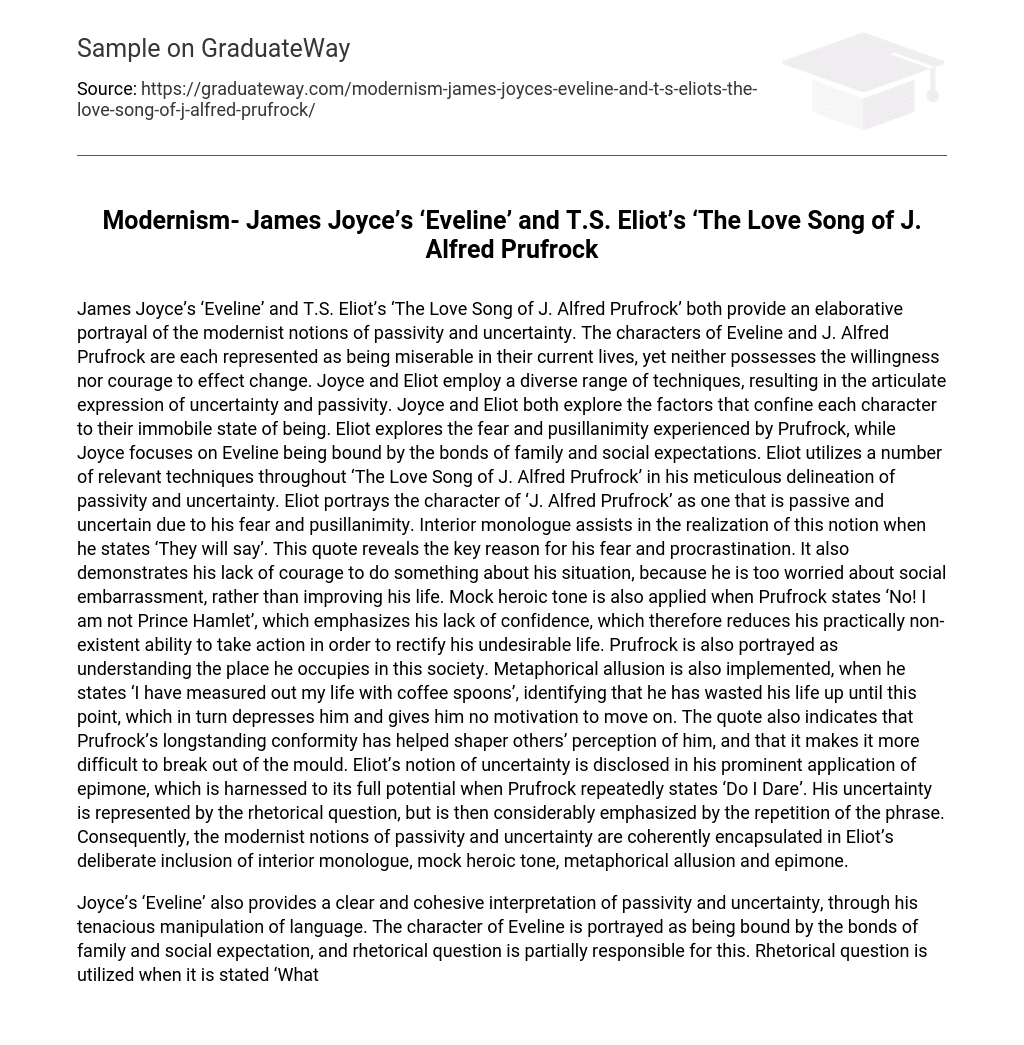James Joyce’s ‘Eveline’ and T.S.
Eliot’s ‘The Love Song of J. Alfred Prufrock’ both provide an elaborative portrayal of the modernist notions of passivity and uncertainty. The characters of Eveline and J. Alfred Prufrock are each represented as being miserable in their current lives, yet neither possesses the willingness nor courage to effect change.
Joyce and Eliot employ a diverse range of techniques, resulting in the articulate expression of uncertainty and passivity. Joyce and Eliot both explore the factors that confine each character to their immobile state of being. Eliot explores the fear and pusillanimity experienced by Prufrock, while Joyce focuses on Eveline being bound by the bonds of family and social expectations. Eliot utilizes a number of relevant techniques throughout ‘The Love Song of J. Alfred Prufrock’ in his meticulous delineation of passivity and uncertainty. Eliot portrays the character of ‘J.
Alfred Prufrock’ as one that is passive and uncertain due to his fear and pusillanimity. Interior monologue assists in the realization of this notion when he states ‘They will say’. This quote reveals the key reason for his fear and procrastination. It also demonstrates his lack of courage to do something about his situation, because he is too worried about social embarrassment, rather than improving his life.
Mock heroic tone is also applied when Prufrock states ‘No! I am not Prince Hamlet’, which emphasizes his lack of confidence, which therefore reduces his practically non-existent ability to take action in order to rectify his undesirable life. Prufrock is also portrayed as understanding the place he occupies in this society. Metaphorical allusion is also implemented, when he states ‘I have measured out my life with coffee spoons’, identifying that he has wasted his life up until this point, which in turn depresses him and gives him no motivation to move on. The quote also indicates that Prufrock’s longstanding conformity has helped shaper others’ perception of him, and that it makes it more difficult to break out of the mould. Eliot’s notion of uncertainty is disclosed in his prominent application of epimone, which is harnessed to its full potential when Prufrock repeatedly states ‘Do I Dare’. His uncertainty is represented by the rhetorical question, but is then considerably emphasized by the repetition of the phrase.
Consequently, the modernist notions of passivity and uncertainty are coherently encapsulated in Eliot’s deliberate inclusion of interior monologue, mock heroic tone, metaphorical allusion and epimone. Joyce’s ‘Eveline’ also provides a clear and cohesive interpretation of passivity and uncertainty, through his tenacious manipulation of language. The character of Eveline is portrayed as being bound by the bonds of family and social expectation, and rhetorical question is partially responsible for this. Rhetorical question is utilized when it is stated ‘What would they say of her’, enunciating her susceptibility to the pressure of social expectations. When she is reminiscing of her dead mother, epiphany is present when she suddenly deems the idea ‘Escape! She must escape!’, identifying her intense yearning to run away. Metaphorical allusion then identifies the sudden despair she experiences at the thought of leaving her home and family forever, when ‘Her distress awoke a nausea in her body’, ‘A bell clanged upon her heart’, and ‘All the seas of the world tumbled around her heart’.
This exposes her extreme uncertainty, because of the way in which her sudden desire to leave is abruptly met with severe anxiety. Joyce then engages repetition, when Eveline states ‘No! No! No! It was impossible’. This signifies her passivity, because after everything, she has now come to the conclusion to do absolutely nothing at all and stay in her undesirable life, when really, she is longing to escape. Therefore, the modernist notions of passivity and uncertainty are efficiently embedded in Joyce’s prominent employment of rhetorical question, epiphany, metaphorical allusion and repetition. James Joyce and T.S. Eliot both present a perceptive insight into the modernist themes of uncertainty and passivity, through their respective texts, ‘Eveline’ and ‘The Love Song of J.
Alfred Prufrock’. Both characters are portrayed as miserable in their current lives, yet neither can seem to change this. Eliot explores the fear and pusillanimity experienced by Prufrock, while Joyce focuses on Eveline being bound by the bonds of family and social expectations.





